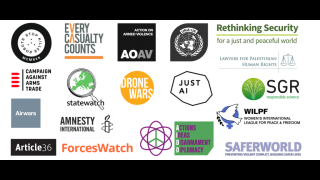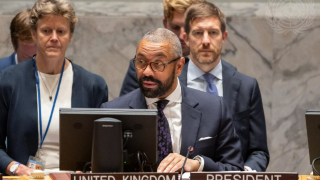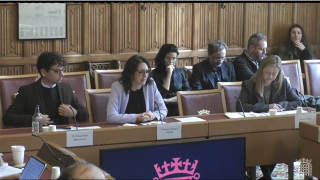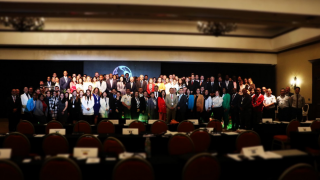
In response to a letter from UNA-UK and others calling for UK leadership to regulate Lethal Autonomous Weapons Systems (LAWS), also known as 'killer robots,' the UK has reasserted the requirement for human oversight in weapons systems but has stopped short of committing to work for a new prohibition on LAWS.
Over 120 states at the UN, including the UK, are in the midst of a process to consider new regulations in response to the challenges posed by increasing autonomy in weapons systems. Ahead of the first of two planned international meetings of governmental experts this year, UNA-UK joined forces with tech companies, NGOs and academics, to urge the UK to take preventative action to prohibit LAWS at a global level or face the prospect of a 'stark dehumanisation' of how military force might be applied. The letter also notes that the UK's current lack of political leadership on this issue is at odds with the Prime Minister's expressed commitment for the UK to be a leader in ethical artificial intelligence (AI).
In reiterating Britain's position that existing international humanitarian law is sufficient to regulate human control in weapons systems, the UK's response rejects calls by growing numbers of states, civil society, AI experts and high-level UN officials for a specific prohibition on LAWS based on a collectively agreed definition. The UK's position also misses the opportunity to send a clear signal to all those around the world working on AI that there is a red line when it comes to machines making decisions of life and death without a human in the loop.
UN Secretary-General, António Gutteres, recently called for "legally binding arrangements, to make sure human beings control the use of force at all times" as part of his new disarmament agenda.
UK definition of LAWS ‘out of step’
The House of Lords Select Committee on Artificial Intelligence recently found that the UK Government’s definition of an autonomous system used by the military is “clearly out of step with the definitions used by most other governments". The Committee further noted that the definition inhibits the UK from playing an "active role as a moral and ethical leader on the global stage" and "fundamentally hamstrings attempts to arrive at an internationally agreed definition". The Committee gave the Government until December 2018 to come up with a revised wording in line with that of other states.
In 2017 the UK's problematic definition of autonomy which requires the system to be ‘capable of understanding higher-level intent’ was copied over to a new Joint Doctrine Publication (JDP) on the use of unmanned aircraft systems. The definition sets the threshold for an autonomous system concerningly high, and in doing so, gives the green light for an unacceptable degree of autonomy in weapons systems before the UK's definition of LAWS is triggered. The JDP also contains an acknowledgement that the UK's definition differs from that of other countries and industry, making the UK's response to the Committee's findings, published in June 2018, that the Ministry of Defence has "no plans to change the definition of an autonomous system" highly surprising and obstructive to the international process to build consensus on an internationally agreed definition. This recalcitrant position also appears to contradict a statement made last November by MOD Minister, Mark Lancaster MP, who stated that "the task in hand is absolutely to get an internationally agreed definition, and we believe that the UN CCW is the right forum in which to do so".
The future of LAWS
The pace of technology paired with the current lack of urgency regarding regulation, creates an urgent need for preventative action to regulate LAWS. Through its commitment to the rules-based international system and its support for the ‘ethical AI’ agenda the UK should put this issue at the heart of its Global Britain vision and adopt a cooperative approach to agree a new global standard for human control in weapons systems. By doing so, the UK, as a proactive member of the international community, can send a strong message to militaries and industry worldwide that individual decisions over human life should never be devolved wholesale to a machine.
As an active member of the Campaign to Stop Killer Robots, UNA-UK will continue to campaign for the UK to support a prohibition. We will be discussing this issue as part of our ‘Global Britain’ Conference on 7 July, book your tickets here.
Read our Joint Letter to the Secretary of State for Foreign Affairs
Read the Response from the Foreign and Commonwealth Office
Photo: The Ministry of Defence building in London. Credit MoD/Crown copyright






